Ethnographic Report: Critical Incident Analysis of Aquam Meeting
VerifiedAdded on 2023/06/11
|13
|2958
|297
Report
AI Summary
This ethnographic report delves into a critical incident involving cultural miscommunication between George, a senior Vice President at Aquam, and Bo Chen, an employee. The report analyzes a mentoring meeting where George addresses Bo's lack of participation in meetings. Using the Something’s Up! cycle, the report examines the underlying cultural differences and assumptions that contribute to the miscommunication. George initially attributes Bo's silence to language barriers, providing him with a book of idioms. However, Bo explains that his cultural background emphasizes silence and indirect communication. The analysis reveals disparities in communication styles, power distance, and expectations of participation. The report concludes by suggesting short-term and long-term goals for both George and Bo to improve understanding and foster a more inclusive communication environment. The incident highlights the importance of cultural sensitivity and awareness in organizational settings, emphasizing the need for managers to recognize and address cultural influences on employee behavior.
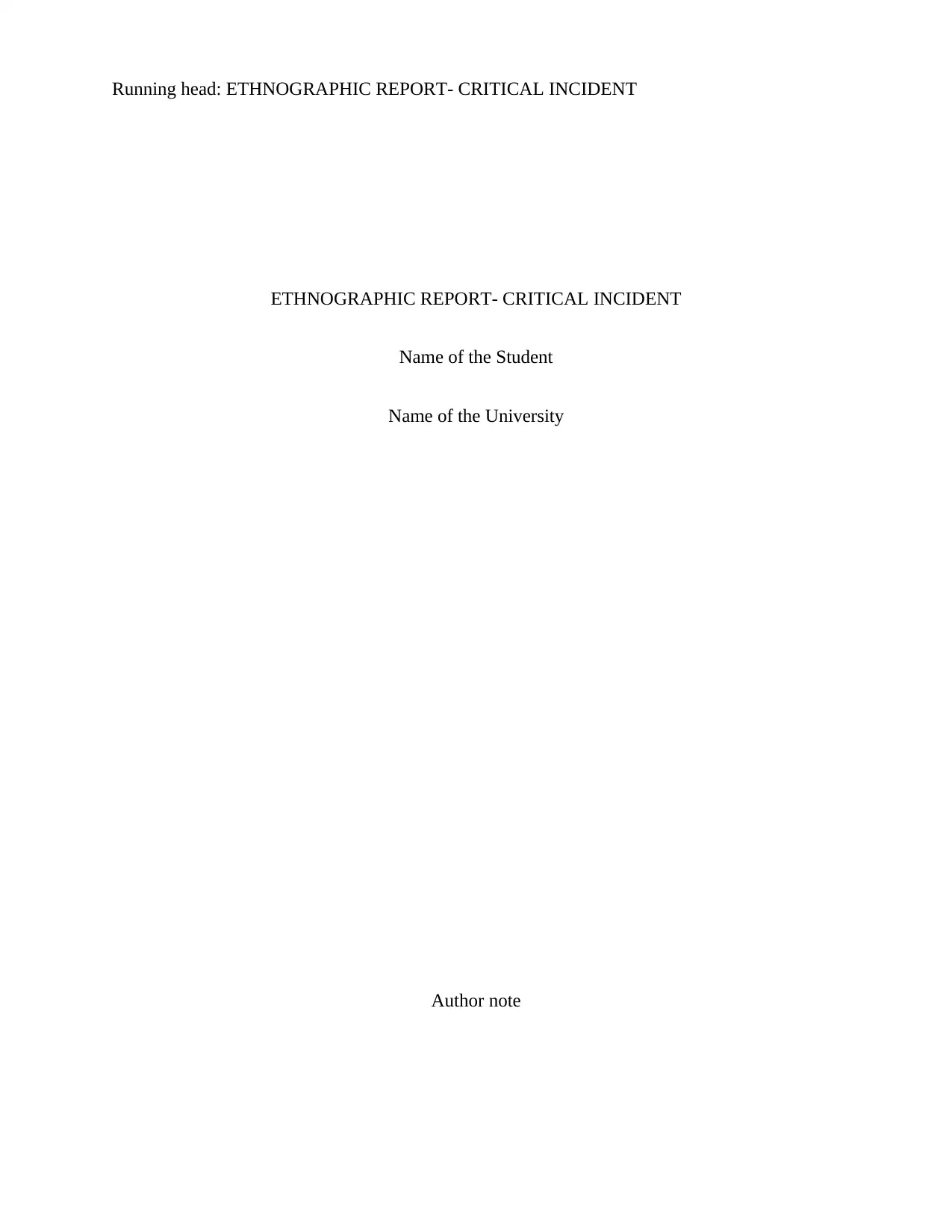
Running head: ETHNOGRAPHIC REPORT- CRITICAL INCIDENT
ETHNOGRAPHIC REPORT- CRITICAL INCIDENT
Name of the Student
Name of the University
Author note
ETHNOGRAPHIC REPORT- CRITICAL INCIDENT
Name of the Student
Name of the University
Author note
Paraphrase This Document
Need a fresh take? Get an instant paraphrase of this document with our AI Paraphraser
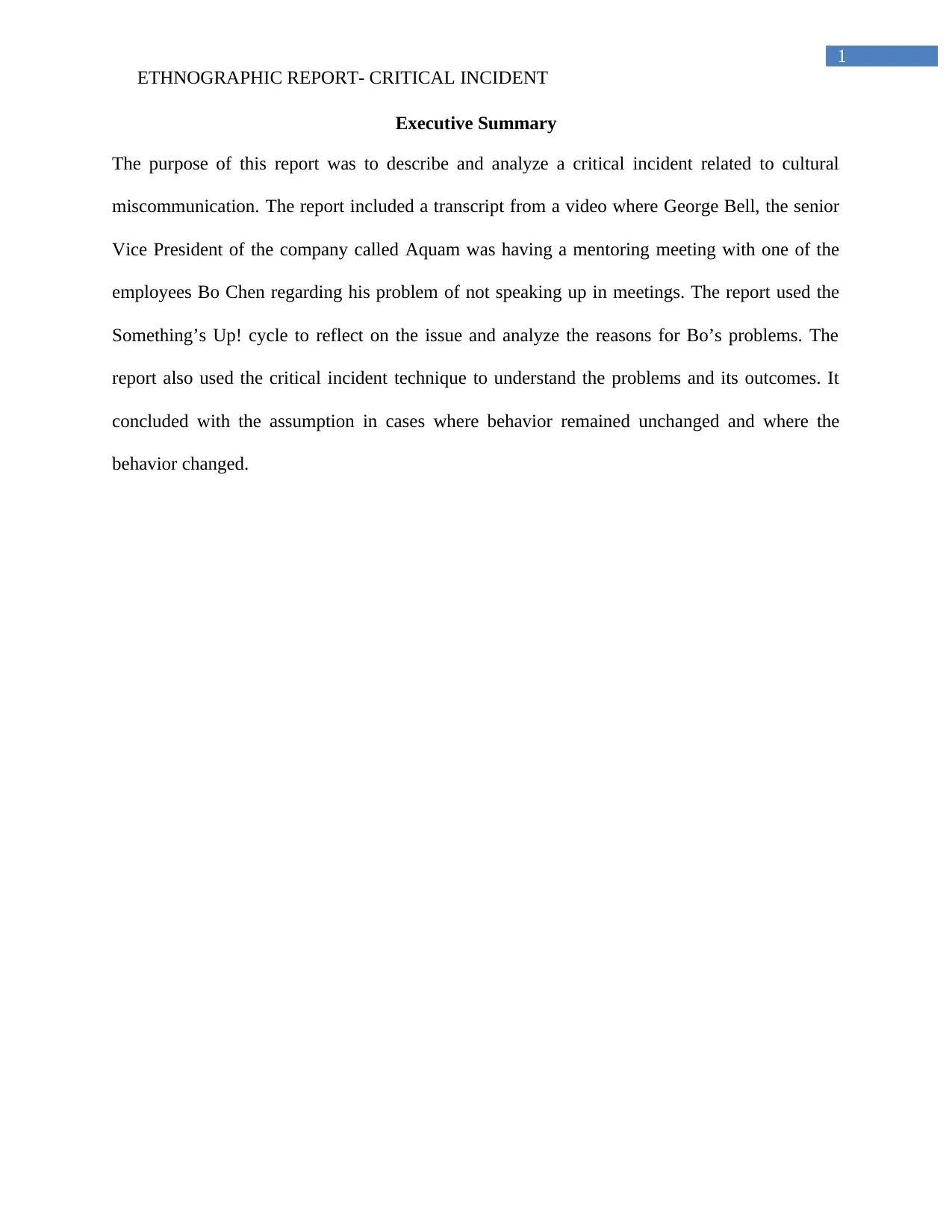
1
ETHNOGRAPHIC REPORT- CRITICAL INCIDENT
Executive Summary
The purpose of this report was to describe and analyze a critical incident related to cultural
miscommunication. The report included a transcript from a video where George Bell, the senior
Vice President of the company called Aquam was having a mentoring meeting with one of the
employees Bo Chen regarding his problem of not speaking up in meetings. The report used the
Something’s Up! cycle to reflect on the issue and analyze the reasons for Bo’s problems. The
report also used the critical incident technique to understand the problems and its outcomes. It
concluded with the assumption in cases where behavior remained unchanged and where the
behavior changed.
ETHNOGRAPHIC REPORT- CRITICAL INCIDENT
Executive Summary
The purpose of this report was to describe and analyze a critical incident related to cultural
miscommunication. The report included a transcript from a video where George Bell, the senior
Vice President of the company called Aquam was having a mentoring meeting with one of the
employees Bo Chen regarding his problem of not speaking up in meetings. The report used the
Something’s Up! cycle to reflect on the issue and analyze the reasons for Bo’s problems. The
report also used the critical incident technique to understand the problems and its outcomes. It
concluded with the assumption in cases where behavior remained unchanged and where the
behavior changed.
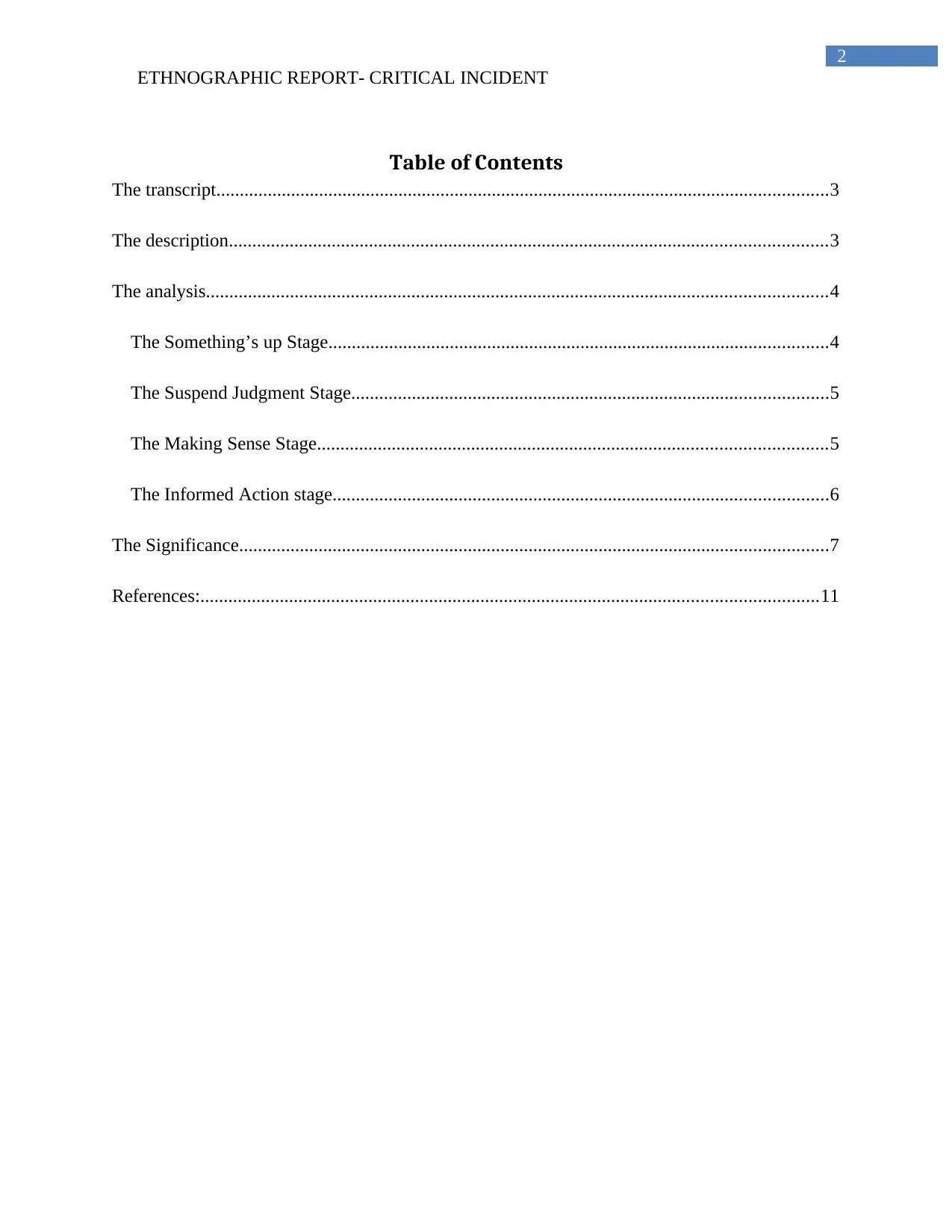
2
ETHNOGRAPHIC REPORT- CRITICAL INCIDENT
Table of Contents
The transcript...................................................................................................................................3
The description................................................................................................................................3
The analysis.....................................................................................................................................4
The Something’s up Stage...........................................................................................................4
The Suspend Judgment Stage......................................................................................................5
The Making Sense Stage.............................................................................................................5
The Informed Action stage..........................................................................................................6
The Significance..............................................................................................................................7
References:....................................................................................................................................11
ETHNOGRAPHIC REPORT- CRITICAL INCIDENT
Table of Contents
The transcript...................................................................................................................................3
The description................................................................................................................................3
The analysis.....................................................................................................................................4
The Something’s up Stage...........................................................................................................4
The Suspend Judgment Stage......................................................................................................5
The Making Sense Stage.............................................................................................................5
The Informed Action stage..........................................................................................................6
The Significance..............................................................................................................................7
References:....................................................................................................................................11
⊘ This is a preview!⊘
Do you want full access?
Subscribe today to unlock all pages.

Trusted by 1+ million students worldwide
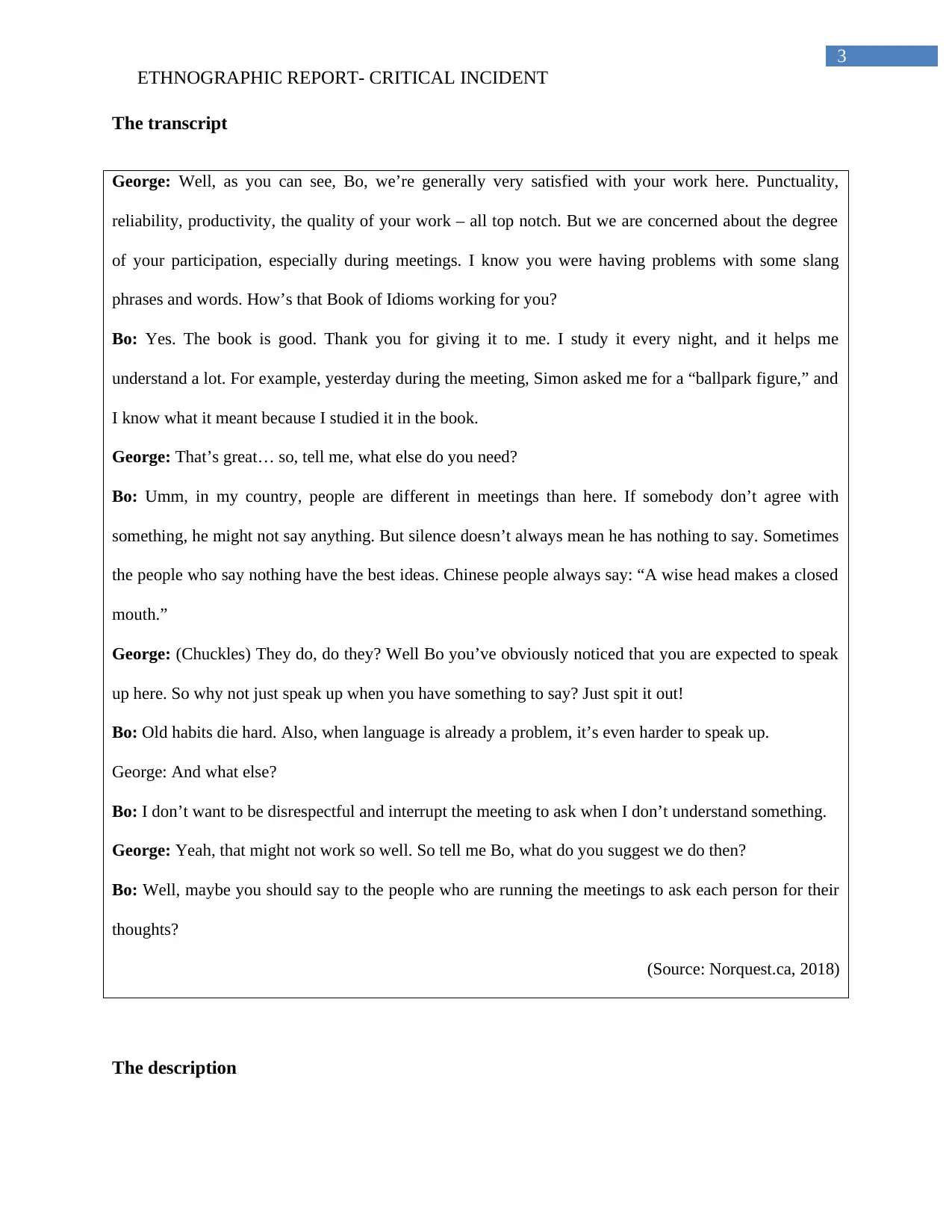
3
ETHNOGRAPHIC REPORT- CRITICAL INCIDENT
The transcript
George: Well, as you can see, Bo, we’re generally very satisfied with your work here. Punctuality,
reliability, productivity, the quality of your work – all top notch. But we are concerned about the degree
of your participation, especially during meetings. I know you were having problems with some slang
phrases and words. How’s that Book of Idioms working for you?
Bo: Yes. The book is good. Thank you for giving it to me. I study it every night, and it helps me
understand a lot. For example, yesterday during the meeting, Simon asked me for a “ballpark figure,” and
I know what it meant because I studied it in the book.
George: That’s great… so, tell me, what else do you need?
Bo: Umm, in my country, people are different in meetings than here. If somebody don’t agree with
something, he might not say anything. But silence doesn’t always mean he has nothing to say. Sometimes
the people who say nothing have the best ideas. Chinese people always say: “A wise head makes a closed
mouth.”
George: (Chuckles) They do, do they? Well Bo you’ve obviously noticed that you are expected to speak
up here. So why not just speak up when you have something to say? Just spit it out!
Bo: Old habits die hard. Also, when language is already a problem, it’s even harder to speak up.
George: And what else?
Bo: I don’t want to be disrespectful and interrupt the meeting to ask when I don’t understand something.
George: Yeah, that might not work so well. So tell me Bo, what do you suggest we do then?
Bo: Well, maybe you should say to the people who are running the meetings to ask each person for their
thoughts?
(Source: Norquest.ca, 2018)
The description
ETHNOGRAPHIC REPORT- CRITICAL INCIDENT
The transcript
George: Well, as you can see, Bo, we’re generally very satisfied with your work here. Punctuality,
reliability, productivity, the quality of your work – all top notch. But we are concerned about the degree
of your participation, especially during meetings. I know you were having problems with some slang
phrases and words. How’s that Book of Idioms working for you?
Bo: Yes. The book is good. Thank you for giving it to me. I study it every night, and it helps me
understand a lot. For example, yesterday during the meeting, Simon asked me for a “ballpark figure,” and
I know what it meant because I studied it in the book.
George: That’s great… so, tell me, what else do you need?
Bo: Umm, in my country, people are different in meetings than here. If somebody don’t agree with
something, he might not say anything. But silence doesn’t always mean he has nothing to say. Sometimes
the people who say nothing have the best ideas. Chinese people always say: “A wise head makes a closed
mouth.”
George: (Chuckles) They do, do they? Well Bo you’ve obviously noticed that you are expected to speak
up here. So why not just speak up when you have something to say? Just spit it out!
Bo: Old habits die hard. Also, when language is already a problem, it’s even harder to speak up.
George: And what else?
Bo: I don’t want to be disrespectful and interrupt the meeting to ask when I don’t understand something.
George: Yeah, that might not work so well. So tell me Bo, what do you suggest we do then?
Bo: Well, maybe you should say to the people who are running the meetings to ask each person for their
thoughts?
(Source: Norquest.ca, 2018)
The description
Paraphrase This Document
Need a fresh take? Get an instant paraphrase of this document with our AI Paraphraser
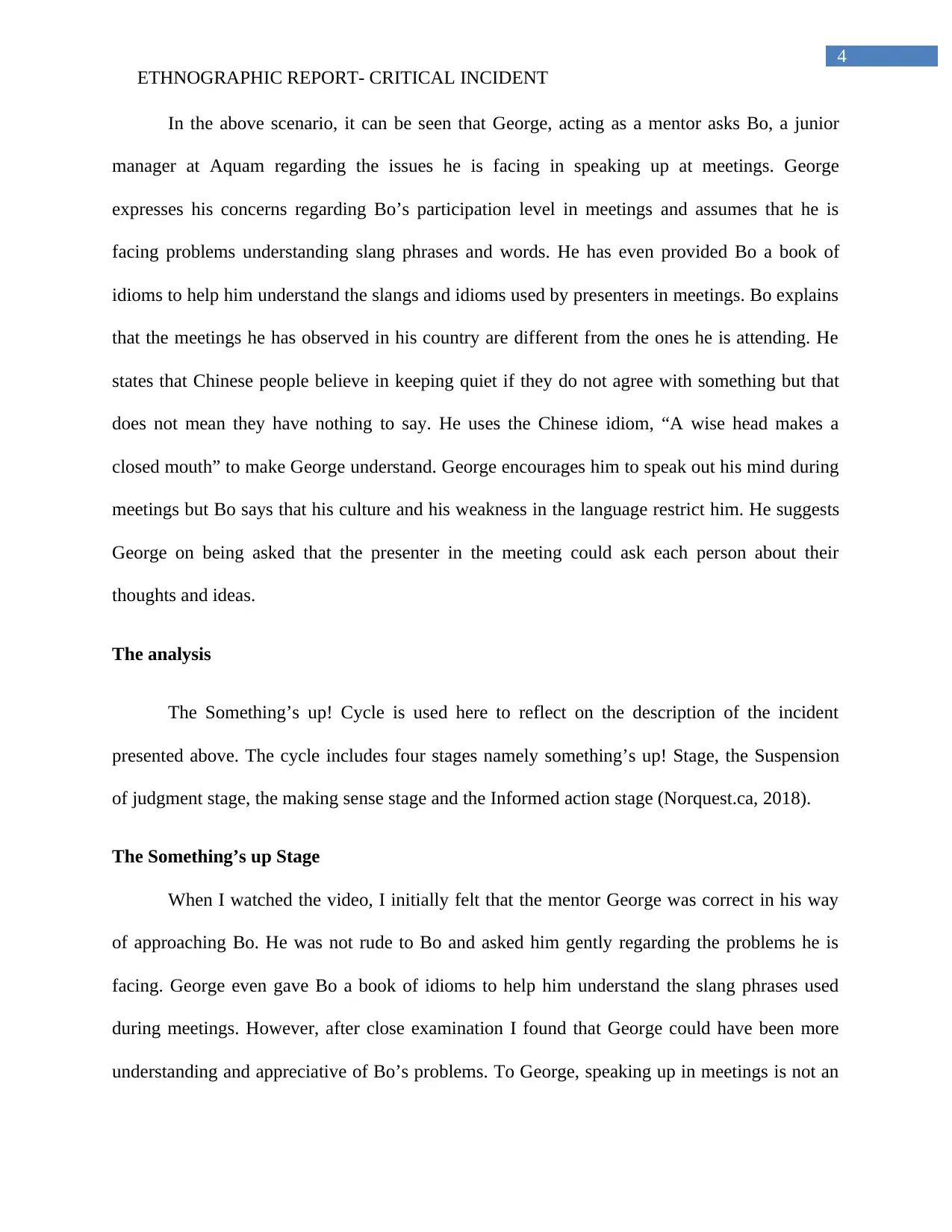
4
ETHNOGRAPHIC REPORT- CRITICAL INCIDENT
In the above scenario, it can be seen that George, acting as a mentor asks Bo, a junior
manager at Aquam regarding the issues he is facing in speaking up at meetings. George
expresses his concerns regarding Bo’s participation level in meetings and assumes that he is
facing problems understanding slang phrases and words. He has even provided Bo a book of
idioms to help him understand the slangs and idioms used by presenters in meetings. Bo explains
that the meetings he has observed in his country are different from the ones he is attending. He
states that Chinese people believe in keeping quiet if they do not agree with something but that
does not mean they have nothing to say. He uses the Chinese idiom, “A wise head makes a
closed mouth” to make George understand. George encourages him to speak out his mind during
meetings but Bo says that his culture and his weakness in the language restrict him. He suggests
George on being asked that the presenter in the meeting could ask each person about their
thoughts and ideas.
The analysis
The Something’s up! Cycle is used here to reflect on the description of the incident
presented above. The cycle includes four stages namely something’s up! Stage, the Suspension
of judgment stage, the making sense stage and the Informed action stage (Norquest.ca, 2018).
The Something’s up Stage
When I watched the video, I initially felt that the mentor George was correct in his way
of approaching Bo. He was not rude to Bo and asked him gently regarding the problems he is
facing. George even gave Bo a book of idioms to help him understand the slang phrases used
during meetings. However, after close examination I found that George could have been more
understanding and appreciative of Bo’s problems. To George, speaking up in meetings is not an
ETHNOGRAPHIC REPORT- CRITICAL INCIDENT
In the above scenario, it can be seen that George, acting as a mentor asks Bo, a junior
manager at Aquam regarding the issues he is facing in speaking up at meetings. George
expresses his concerns regarding Bo’s participation level in meetings and assumes that he is
facing problems understanding slang phrases and words. He has even provided Bo a book of
idioms to help him understand the slangs and idioms used by presenters in meetings. Bo explains
that the meetings he has observed in his country are different from the ones he is attending. He
states that Chinese people believe in keeping quiet if they do not agree with something but that
does not mean they have nothing to say. He uses the Chinese idiom, “A wise head makes a
closed mouth” to make George understand. George encourages him to speak out his mind during
meetings but Bo says that his culture and his weakness in the language restrict him. He suggests
George on being asked that the presenter in the meeting could ask each person about their
thoughts and ideas.
The analysis
The Something’s up! Cycle is used here to reflect on the description of the incident
presented above. The cycle includes four stages namely something’s up! Stage, the Suspension
of judgment stage, the making sense stage and the Informed action stage (Norquest.ca, 2018).
The Something’s up Stage
When I watched the video, I initially felt that the mentor George was correct in his way
of approaching Bo. He was not rude to Bo and asked him gently regarding the problems he is
facing. George even gave Bo a book of idioms to help him understand the slang phrases used
during meetings. However, after close examination I found that George could have been more
understanding and appreciative of Bo’s problems. To George, speaking up in meetings is not an
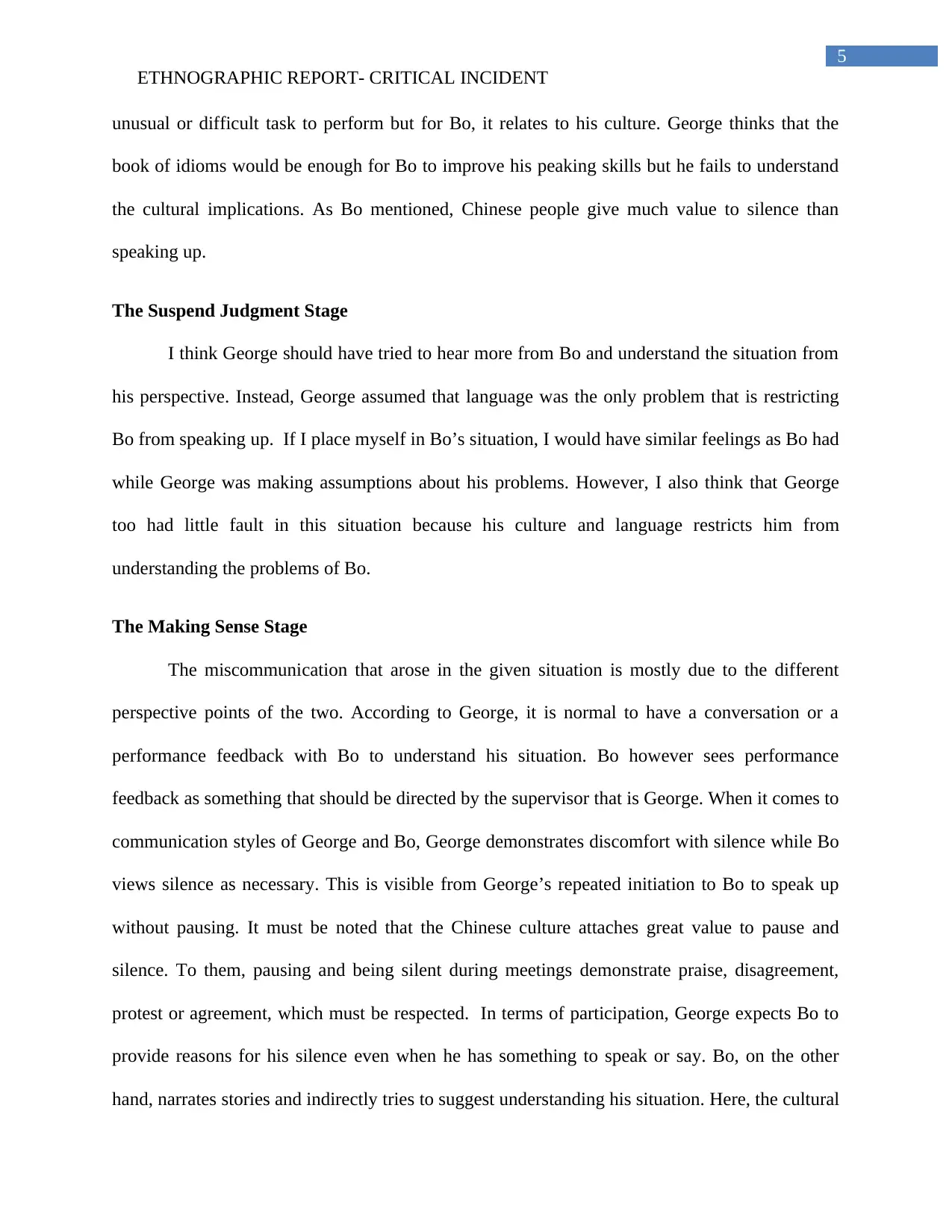
5
ETHNOGRAPHIC REPORT- CRITICAL INCIDENT
unusual or difficult task to perform but for Bo, it relates to his culture. George thinks that the
book of idioms would be enough for Bo to improve his peaking skills but he fails to understand
the cultural implications. As Bo mentioned, Chinese people give much value to silence than
speaking up.
The Suspend Judgment Stage
I think George should have tried to hear more from Bo and understand the situation from
his perspective. Instead, George assumed that language was the only problem that is restricting
Bo from speaking up. If I place myself in Bo’s situation, I would have similar feelings as Bo had
while George was making assumptions about his problems. However, I also think that George
too had little fault in this situation because his culture and language restricts him from
understanding the problems of Bo.
The Making Sense Stage
The miscommunication that arose in the given situation is mostly due to the different
perspective points of the two. According to George, it is normal to have a conversation or a
performance feedback with Bo to understand his situation. Bo however sees performance
feedback as something that should be directed by the supervisor that is George. When it comes to
communication styles of George and Bo, George demonstrates discomfort with silence while Bo
views silence as necessary. This is visible from George’s repeated initiation to Bo to speak up
without pausing. It must be noted that the Chinese culture attaches great value to pause and
silence. To them, pausing and being silent during meetings demonstrate praise, disagreement,
protest or agreement, which must be respected. In terms of participation, George expects Bo to
provide reasons for his silence even when he has something to speak or say. Bo, on the other
hand, narrates stories and indirectly tries to suggest understanding his situation. Here, the cultural
ETHNOGRAPHIC REPORT- CRITICAL INCIDENT
unusual or difficult task to perform but for Bo, it relates to his culture. George thinks that the
book of idioms would be enough for Bo to improve his peaking skills but he fails to understand
the cultural implications. As Bo mentioned, Chinese people give much value to silence than
speaking up.
The Suspend Judgment Stage
I think George should have tried to hear more from Bo and understand the situation from
his perspective. Instead, George assumed that language was the only problem that is restricting
Bo from speaking up. If I place myself in Bo’s situation, I would have similar feelings as Bo had
while George was making assumptions about his problems. However, I also think that George
too had little fault in this situation because his culture and language restricts him from
understanding the problems of Bo.
The Making Sense Stage
The miscommunication that arose in the given situation is mostly due to the different
perspective points of the two. According to George, it is normal to have a conversation or a
performance feedback with Bo to understand his situation. Bo however sees performance
feedback as something that should be directed by the supervisor that is George. When it comes to
communication styles of George and Bo, George demonstrates discomfort with silence while Bo
views silence as necessary. This is visible from George’s repeated initiation to Bo to speak up
without pausing. It must be noted that the Chinese culture attaches great value to pause and
silence. To them, pausing and being silent during meetings demonstrate praise, disagreement,
protest or agreement, which must be respected. In terms of participation, George expects Bo to
provide reasons for his silence even when he has something to speak or say. Bo, on the other
hand, narrates stories and indirectly tries to suggest understanding his situation. Here, the cultural
⊘ This is a preview!⊘
Do you want full access?
Subscribe today to unlock all pages.

Trusted by 1+ million students worldwide
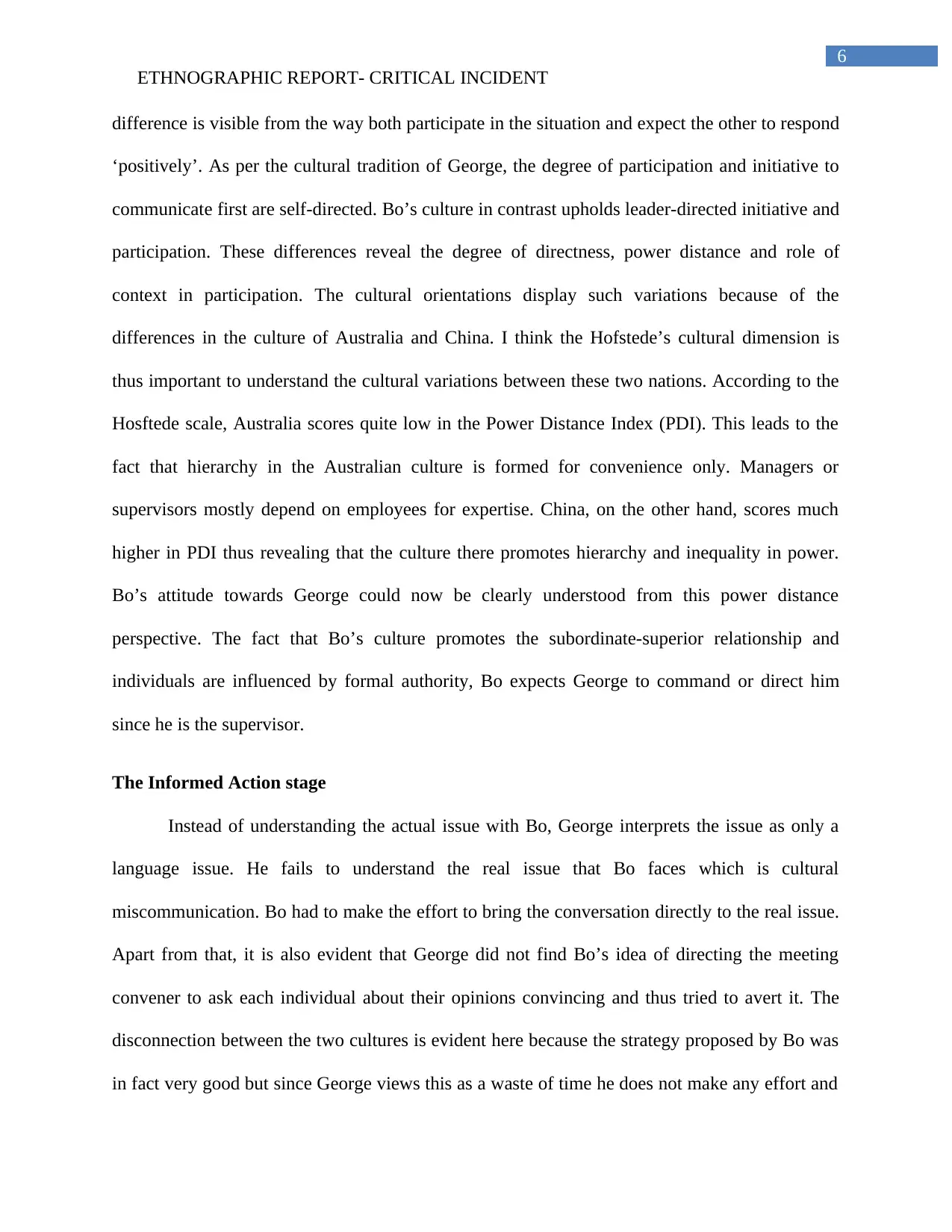
6
ETHNOGRAPHIC REPORT- CRITICAL INCIDENT
difference is visible from the way both participate in the situation and expect the other to respond
‘positively’. As per the cultural tradition of George, the degree of participation and initiative to
communicate first are self-directed. Bo’s culture in contrast upholds leader-directed initiative and
participation. These differences reveal the degree of directness, power distance and role of
context in participation. The cultural orientations display such variations because of the
differences in the culture of Australia and China. I think the Hofstede’s cultural dimension is
thus important to understand the cultural variations between these two nations. According to the
Hosftede scale, Australia scores quite low in the Power Distance Index (PDI). This leads to the
fact that hierarchy in the Australian culture is formed for convenience only. Managers or
supervisors mostly depend on employees for expertise. China, on the other hand, scores much
higher in PDI thus revealing that the culture there promotes hierarchy and inequality in power.
Bo’s attitude towards George could now be clearly understood from this power distance
perspective. The fact that Bo’s culture promotes the subordinate-superior relationship and
individuals are influenced by formal authority, Bo expects George to command or direct him
since he is the supervisor.
The Informed Action stage
Instead of understanding the actual issue with Bo, George interprets the issue as only a
language issue. He fails to understand the real issue that Bo faces which is cultural
miscommunication. Bo had to make the effort to bring the conversation directly to the real issue.
Apart from that, it is also evident that George did not find Bo’s idea of directing the meeting
convener to ask each individual about their opinions convincing and thus tried to avert it. The
disconnection between the two cultures is evident here because the strategy proposed by Bo was
in fact very good but since George views this as a waste of time he does not make any effort and
ETHNOGRAPHIC REPORT- CRITICAL INCIDENT
difference is visible from the way both participate in the situation and expect the other to respond
‘positively’. As per the cultural tradition of George, the degree of participation and initiative to
communicate first are self-directed. Bo’s culture in contrast upholds leader-directed initiative and
participation. These differences reveal the degree of directness, power distance and role of
context in participation. The cultural orientations display such variations because of the
differences in the culture of Australia and China. I think the Hofstede’s cultural dimension is
thus important to understand the cultural variations between these two nations. According to the
Hosftede scale, Australia scores quite low in the Power Distance Index (PDI). This leads to the
fact that hierarchy in the Australian culture is formed for convenience only. Managers or
supervisors mostly depend on employees for expertise. China, on the other hand, scores much
higher in PDI thus revealing that the culture there promotes hierarchy and inequality in power.
Bo’s attitude towards George could now be clearly understood from this power distance
perspective. The fact that Bo’s culture promotes the subordinate-superior relationship and
individuals are influenced by formal authority, Bo expects George to command or direct him
since he is the supervisor.
The Informed Action stage
Instead of understanding the actual issue with Bo, George interprets the issue as only a
language issue. He fails to understand the real issue that Bo faces which is cultural
miscommunication. Bo had to make the effort to bring the conversation directly to the real issue.
Apart from that, it is also evident that George did not find Bo’s idea of directing the meeting
convener to ask each individual about their opinions convincing and thus tried to avert it. The
disconnection between the two cultures is evident here because the strategy proposed by Bo was
in fact very good but since George views this as a waste of time he does not make any effort and
Paraphrase This Document
Need a fresh take? Get an instant paraphrase of this document with our AI Paraphraser
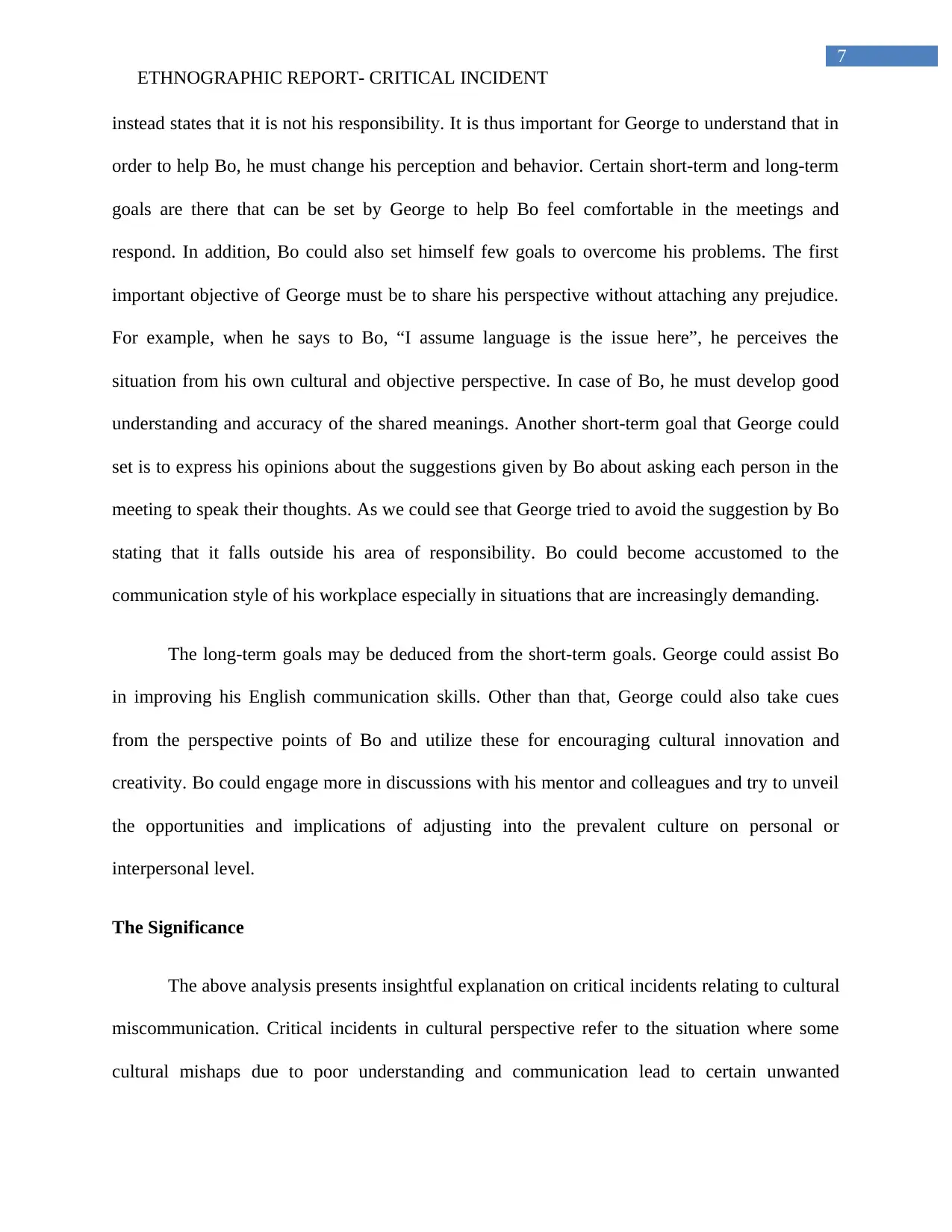
7
ETHNOGRAPHIC REPORT- CRITICAL INCIDENT
instead states that it is not his responsibility. It is thus important for George to understand that in
order to help Bo, he must change his perception and behavior. Certain short-term and long-term
goals are there that can be set by George to help Bo feel comfortable in the meetings and
respond. In addition, Bo could also set himself few goals to overcome his problems. The first
important objective of George must be to share his perspective without attaching any prejudice.
For example, when he says to Bo, “I assume language is the issue here”, he perceives the
situation from his own cultural and objective perspective. In case of Bo, he must develop good
understanding and accuracy of the shared meanings. Another short-term goal that George could
set is to express his opinions about the suggestions given by Bo about asking each person in the
meeting to speak their thoughts. As we could see that George tried to avoid the suggestion by Bo
stating that it falls outside his area of responsibility. Bo could become accustomed to the
communication style of his workplace especially in situations that are increasingly demanding.
The long-term goals may be deduced from the short-term goals. George could assist Bo
in improving his English communication skills. Other than that, George could also take cues
from the perspective points of Bo and utilize these for encouraging cultural innovation and
creativity. Bo could engage more in discussions with his mentor and colleagues and try to unveil
the opportunities and implications of adjusting into the prevalent culture on personal or
interpersonal level.
The Significance
The above analysis presents insightful explanation on critical incidents relating to cultural
miscommunication. Critical incidents in cultural perspective refer to the situation where some
cultural mishaps due to poor understanding and communication lead to certain unwanted
ETHNOGRAPHIC REPORT- CRITICAL INCIDENT
instead states that it is not his responsibility. It is thus important for George to understand that in
order to help Bo, he must change his perception and behavior. Certain short-term and long-term
goals are there that can be set by George to help Bo feel comfortable in the meetings and
respond. In addition, Bo could also set himself few goals to overcome his problems. The first
important objective of George must be to share his perspective without attaching any prejudice.
For example, when he says to Bo, “I assume language is the issue here”, he perceives the
situation from his own cultural and objective perspective. In case of Bo, he must develop good
understanding and accuracy of the shared meanings. Another short-term goal that George could
set is to express his opinions about the suggestions given by Bo about asking each person in the
meeting to speak their thoughts. As we could see that George tried to avoid the suggestion by Bo
stating that it falls outside his area of responsibility. Bo could become accustomed to the
communication style of his workplace especially in situations that are increasingly demanding.
The long-term goals may be deduced from the short-term goals. George could assist Bo
in improving his English communication skills. Other than that, George could also take cues
from the perspective points of Bo and utilize these for encouraging cultural innovation and
creativity. Bo could engage more in discussions with his mentor and colleagues and try to unveil
the opportunities and implications of adjusting into the prevalent culture on personal or
interpersonal level.
The Significance
The above analysis presents insightful explanation on critical incidents relating to cultural
miscommunication. Critical incidents in cultural perspective refer to the situation where some
cultural mishaps due to poor understanding and communication lead to certain unwanted
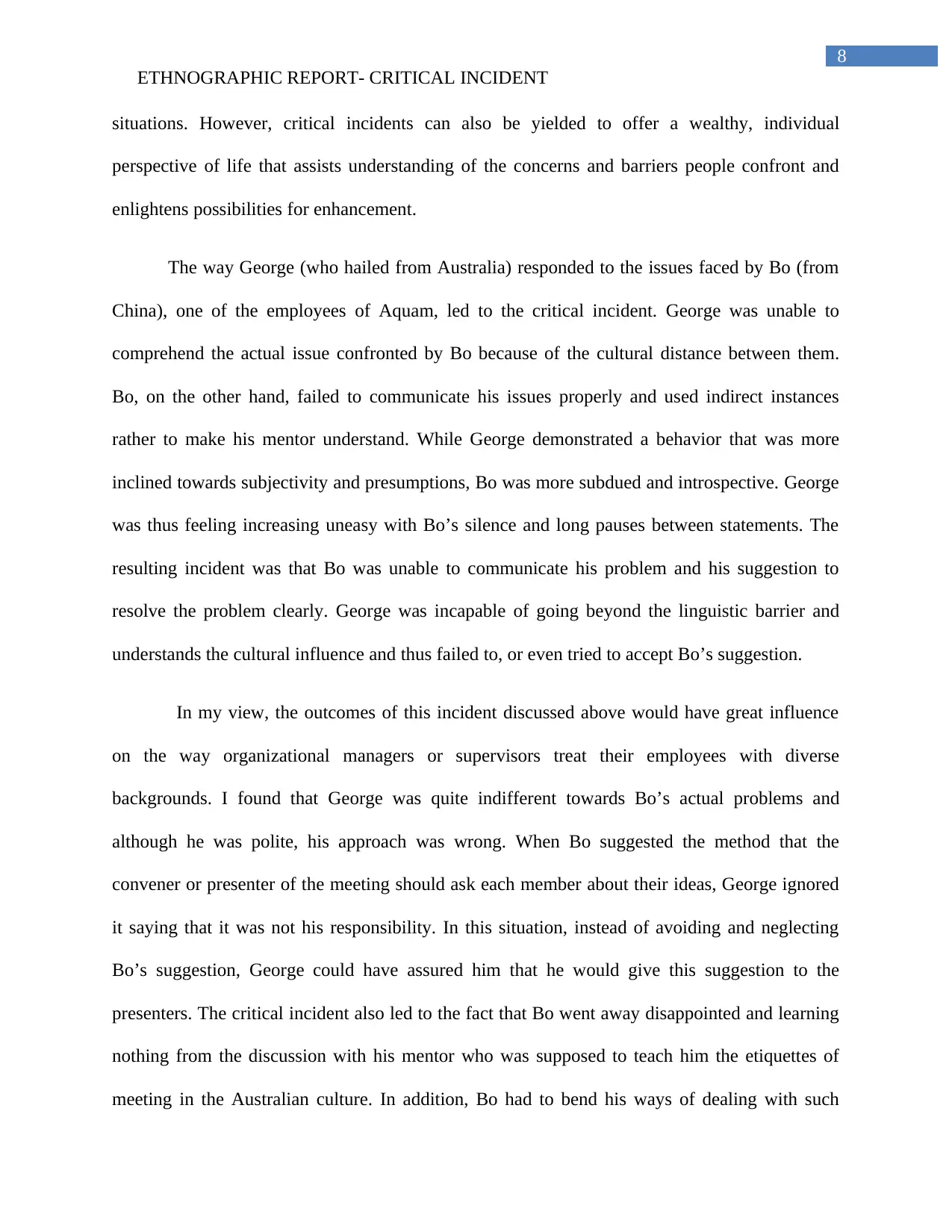
8
ETHNOGRAPHIC REPORT- CRITICAL INCIDENT
situations. However, critical incidents can also be yielded to offer a wealthy, individual
perspective of life that assists understanding of the concerns and barriers people confront and
enlightens possibilities for enhancement.
The way George (who hailed from Australia) responded to the issues faced by Bo (from
China), one of the employees of Aquam, led to the critical incident. George was unable to
comprehend the actual issue confronted by Bo because of the cultural distance between them.
Bo, on the other hand, failed to communicate his issues properly and used indirect instances
rather to make his mentor understand. While George demonstrated a behavior that was more
inclined towards subjectivity and presumptions, Bo was more subdued and introspective. George
was thus feeling increasing uneasy with Bo’s silence and long pauses between statements. The
resulting incident was that Bo was unable to communicate his problem and his suggestion to
resolve the problem clearly. George was incapable of going beyond the linguistic barrier and
understands the cultural influence and thus failed to, or even tried to accept Bo’s suggestion.
In my view, the outcomes of this incident discussed above would have great influence
on the way organizational managers or supervisors treat their employees with diverse
backgrounds. I found that George was quite indifferent towards Bo’s actual problems and
although he was polite, his approach was wrong. When Bo suggested the method that the
convener or presenter of the meeting should ask each member about their ideas, George ignored
it saying that it was not his responsibility. In this situation, instead of avoiding and neglecting
Bo’s suggestion, George could have assured him that he would give this suggestion to the
presenters. The critical incident also led to the fact that Bo went away disappointed and learning
nothing from the discussion with his mentor who was supposed to teach him the etiquettes of
meeting in the Australian culture. In addition, Bo had to bend his ways of dealing with such
ETHNOGRAPHIC REPORT- CRITICAL INCIDENT
situations. However, critical incidents can also be yielded to offer a wealthy, individual
perspective of life that assists understanding of the concerns and barriers people confront and
enlightens possibilities for enhancement.
The way George (who hailed from Australia) responded to the issues faced by Bo (from
China), one of the employees of Aquam, led to the critical incident. George was unable to
comprehend the actual issue confronted by Bo because of the cultural distance between them.
Bo, on the other hand, failed to communicate his issues properly and used indirect instances
rather to make his mentor understand. While George demonstrated a behavior that was more
inclined towards subjectivity and presumptions, Bo was more subdued and introspective. George
was thus feeling increasing uneasy with Bo’s silence and long pauses between statements. The
resulting incident was that Bo was unable to communicate his problem and his suggestion to
resolve the problem clearly. George was incapable of going beyond the linguistic barrier and
understands the cultural influence and thus failed to, or even tried to accept Bo’s suggestion.
In my view, the outcomes of this incident discussed above would have great influence
on the way organizational managers or supervisors treat their employees with diverse
backgrounds. I found that George was quite indifferent towards Bo’s actual problems and
although he was polite, his approach was wrong. When Bo suggested the method that the
convener or presenter of the meeting should ask each member about their ideas, George ignored
it saying that it was not his responsibility. In this situation, instead of avoiding and neglecting
Bo’s suggestion, George could have assured him that he would give this suggestion to the
presenters. The critical incident also led to the fact that Bo went away disappointed and learning
nothing from the discussion with his mentor who was supposed to teach him the etiquettes of
meeting in the Australian culture. In addition, Bo had to bend his ways of dealing with such
⊘ This is a preview!⊘
Do you want full access?
Subscribe today to unlock all pages.

Trusted by 1+ million students worldwide
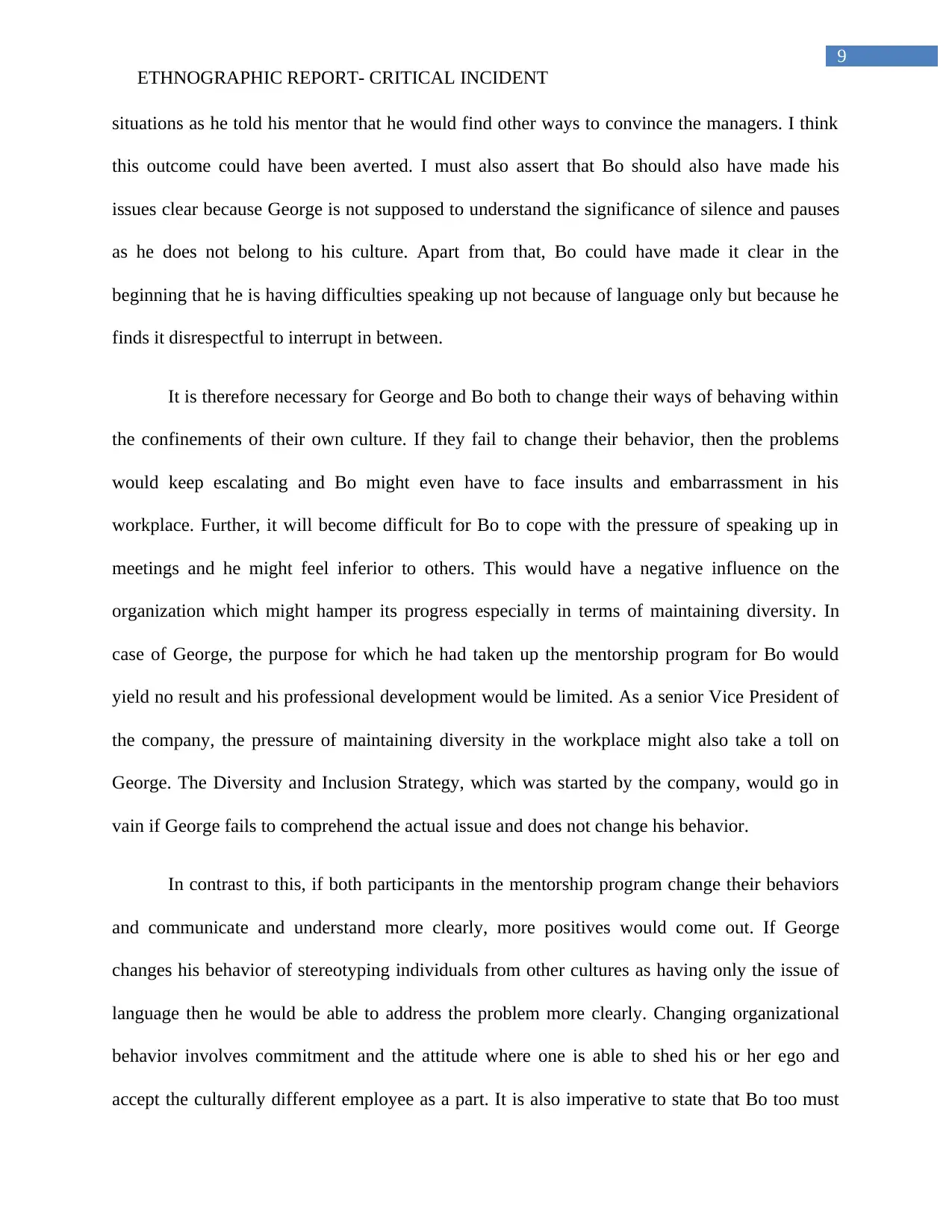
9
ETHNOGRAPHIC REPORT- CRITICAL INCIDENT
situations as he told his mentor that he would find other ways to convince the managers. I think
this outcome could have been averted. I must also assert that Bo should also have made his
issues clear because George is not supposed to understand the significance of silence and pauses
as he does not belong to his culture. Apart from that, Bo could have made it clear in the
beginning that he is having difficulties speaking up not because of language only but because he
finds it disrespectful to interrupt in between.
It is therefore necessary for George and Bo both to change their ways of behaving within
the confinements of their own culture. If they fail to change their behavior, then the problems
would keep escalating and Bo might even have to face insults and embarrassment in his
workplace. Further, it will become difficult for Bo to cope with the pressure of speaking up in
meetings and he might feel inferior to others. This would have a negative influence on the
organization which might hamper its progress especially in terms of maintaining diversity. In
case of George, the purpose for which he had taken up the mentorship program for Bo would
yield no result and his professional development would be limited. As a senior Vice President of
the company, the pressure of maintaining diversity in the workplace might also take a toll on
George. The Diversity and Inclusion Strategy, which was started by the company, would go in
vain if George fails to comprehend the actual issue and does not change his behavior.
In contrast to this, if both participants in the mentorship program change their behaviors
and communicate and understand more clearly, more positives would come out. If George
changes his behavior of stereotyping individuals from other cultures as having only the issue of
language then he would be able to address the problem more clearly. Changing organizational
behavior involves commitment and the attitude where one is able to shed his or her ego and
accept the culturally different employee as a part. It is also imperative to state that Bo too must
ETHNOGRAPHIC REPORT- CRITICAL INCIDENT
situations as he told his mentor that he would find other ways to convince the managers. I think
this outcome could have been averted. I must also assert that Bo should also have made his
issues clear because George is not supposed to understand the significance of silence and pauses
as he does not belong to his culture. Apart from that, Bo could have made it clear in the
beginning that he is having difficulties speaking up not because of language only but because he
finds it disrespectful to interrupt in between.
It is therefore necessary for George and Bo both to change their ways of behaving within
the confinements of their own culture. If they fail to change their behavior, then the problems
would keep escalating and Bo might even have to face insults and embarrassment in his
workplace. Further, it will become difficult for Bo to cope with the pressure of speaking up in
meetings and he might feel inferior to others. This would have a negative influence on the
organization which might hamper its progress especially in terms of maintaining diversity. In
case of George, the purpose for which he had taken up the mentorship program for Bo would
yield no result and his professional development would be limited. As a senior Vice President of
the company, the pressure of maintaining diversity in the workplace might also take a toll on
George. The Diversity and Inclusion Strategy, which was started by the company, would go in
vain if George fails to comprehend the actual issue and does not change his behavior.
In contrast to this, if both participants in the mentorship program change their behaviors
and communicate and understand more clearly, more positives would come out. If George
changes his behavior of stereotyping individuals from other cultures as having only the issue of
language then he would be able to address the problem more clearly. Changing organizational
behavior involves commitment and the attitude where one is able to shed his or her ego and
accept the culturally different employee as a part. It is also imperative to state that Bo too must
Paraphrase This Document
Need a fresh take? Get an instant paraphrase of this document with our AI Paraphraser
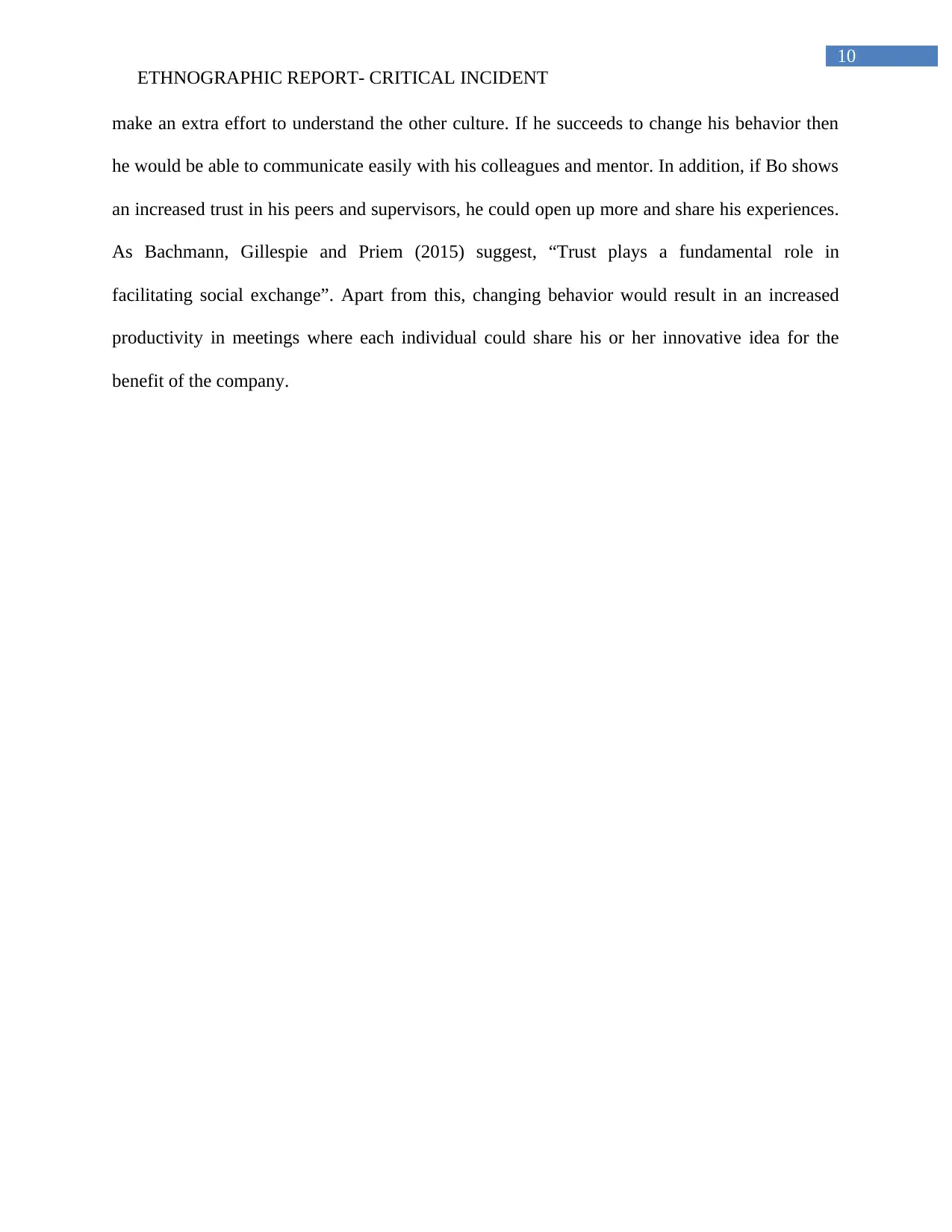
10
ETHNOGRAPHIC REPORT- CRITICAL INCIDENT
make an extra effort to understand the other culture. If he succeeds to change his behavior then
he would be able to communicate easily with his colleagues and mentor. In addition, if Bo shows
an increased trust in his peers and supervisors, he could open up more and share his experiences.
As Bachmann, Gillespie and Priem (2015) suggest, “Trust plays a fundamental role in
facilitating social exchange”. Apart from this, changing behavior would result in an increased
productivity in meetings where each individual could share his or her innovative idea for the
benefit of the company.
ETHNOGRAPHIC REPORT- CRITICAL INCIDENT
make an extra effort to understand the other culture. If he succeeds to change his behavior then
he would be able to communicate easily with his colleagues and mentor. In addition, if Bo shows
an increased trust in his peers and supervisors, he could open up more and share his experiences.
As Bachmann, Gillespie and Priem (2015) suggest, “Trust plays a fundamental role in
facilitating social exchange”. Apart from this, changing behavior would result in an increased
productivity in meetings where each individual could share his or her innovative idea for the
benefit of the company.
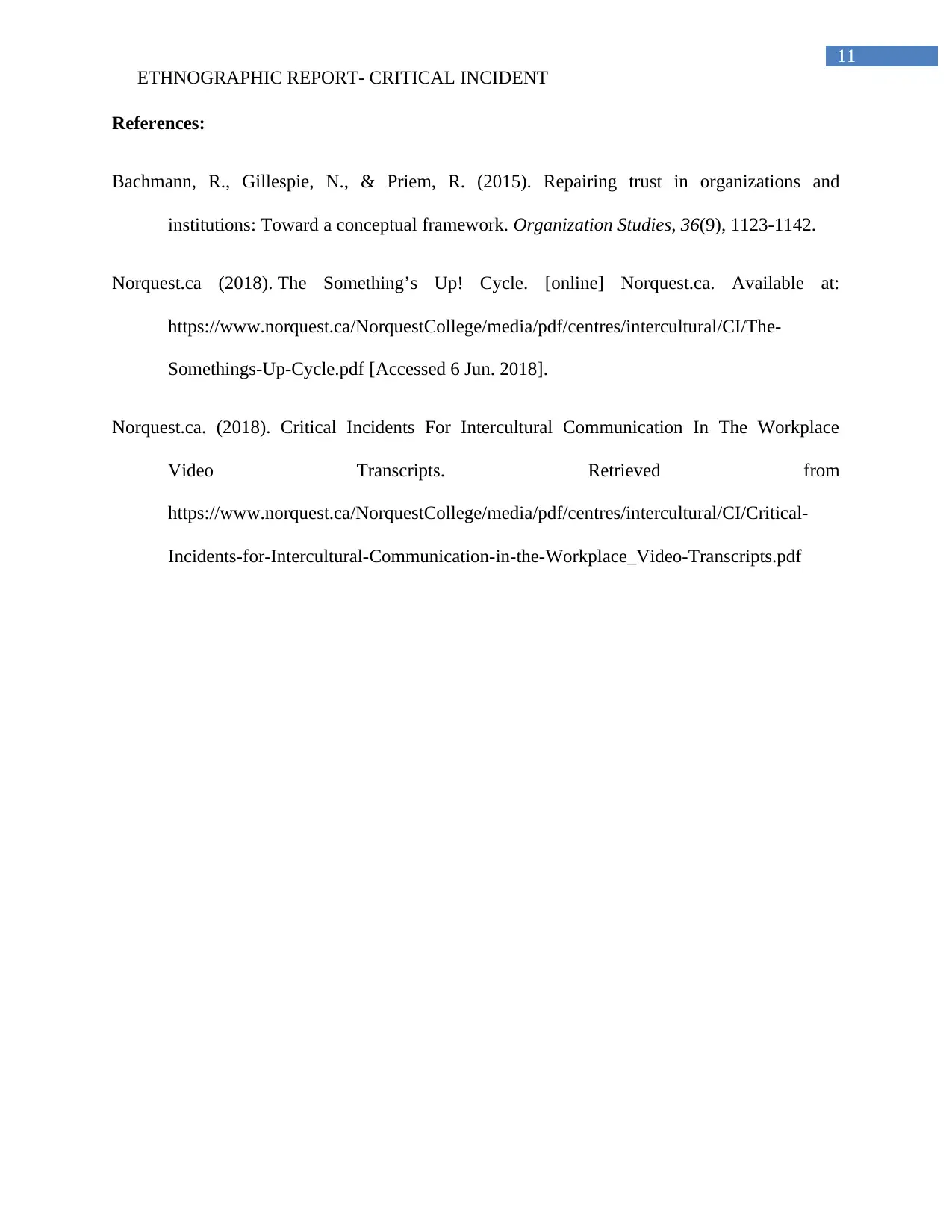
11
ETHNOGRAPHIC REPORT- CRITICAL INCIDENT
References:
Bachmann, R., Gillespie, N., & Priem, R. (2015). Repairing trust in organizations and
institutions: Toward a conceptual framework. Organization Studies, 36(9), 1123-1142.
Norquest.ca (2018). The Something’s Up! Cycle. [online] Norquest.ca. Available at:
https://www.norquest.ca/NorquestCollege/media/pdf/centres/intercultural/CI/The-
Somethings-Up-Cycle.pdf [Accessed 6 Jun. 2018].
Norquest.ca. (2018). Critical Incidents For Intercultural Communication In The Workplace
Video Transcripts. Retrieved from
https://www.norquest.ca/NorquestCollege/media/pdf/centres/intercultural/CI/Critical-
Incidents-for-Intercultural-Communication-in-the-Workplace_Video-Transcripts.pdf
ETHNOGRAPHIC REPORT- CRITICAL INCIDENT
References:
Bachmann, R., Gillespie, N., & Priem, R. (2015). Repairing trust in organizations and
institutions: Toward a conceptual framework. Organization Studies, 36(9), 1123-1142.
Norquest.ca (2018). The Something’s Up! Cycle. [online] Norquest.ca. Available at:
https://www.norquest.ca/NorquestCollege/media/pdf/centres/intercultural/CI/The-
Somethings-Up-Cycle.pdf [Accessed 6 Jun. 2018].
Norquest.ca. (2018). Critical Incidents For Intercultural Communication In The Workplace
Video Transcripts. Retrieved from
https://www.norquest.ca/NorquestCollege/media/pdf/centres/intercultural/CI/Critical-
Incidents-for-Intercultural-Communication-in-the-Workplace_Video-Transcripts.pdf
⊘ This is a preview!⊘
Do you want full access?
Subscribe today to unlock all pages.

Trusted by 1+ million students worldwide
1 out of 13
Related Documents
Your All-in-One AI-Powered Toolkit for Academic Success.
+13062052269
info@desklib.com
Available 24*7 on WhatsApp / Email
![[object Object]](/_next/static/media/star-bottom.7253800d.svg)
Unlock your academic potential
Copyright © 2020–2025 A2Z Services. All Rights Reserved. Developed and managed by ZUCOL.




